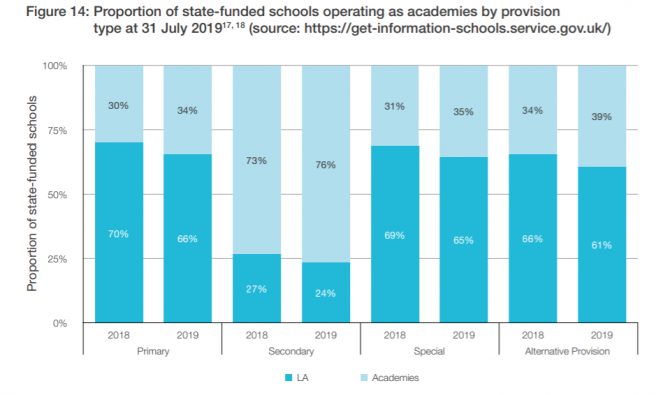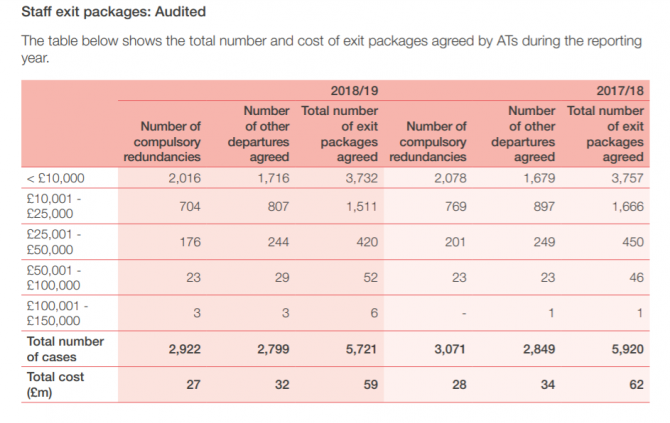The Department for Education has published the annual accounts for spending in the academy sector.
It reveals that the financial health of the sector is improving, the march to academisation is slowing and that the cost of fraud has ballooned.
Here’s your trusty Schools Week round-up of everything you need to know.
1. Nearly 1 in 10 trusts in some regions are in deficit
The financial health of the sector is improving: the overall aggregate cumulative deficit for 2018-19 was £64 million and the aggregate surplus was £2.8 billion (both improvements on the £78 million deficit and £2.5 billion surplus in 2017-18).
A total of 168 academy trusts were in cumulative deficit in August 2019 (6.1 per cent), compared to 195 (6.4 per cent) in August 2018.
A quarter of trusts in in the red posted deficits of over £500,000 last year, and two-thirds were single-academy trusts.
At the other end, nearly 7 per cent of trusts (189) posted surpluses of more than £3 million.
However there are big regional differences: nearly one in ten trusts in both the west Midlands and Lancashire and west Yorkshire were in deficit.
The areas with the lowest cash-strapped trusts were east Midlands and the Humber, north-west London and south-central England and south-east England and south London – at 5 per cent.
One thing worth flagging though: the overall pension deficits across academy trusts has ballooned to £11.1 billion, up from £6.6 billion in 2017-18. This is solely down to changes in actuarial assumptions, which trusts can’t do much about.
2. The march to academisation has slowed
While the number of academies from July 2018 to July last year grew by ten per cent, the pace is slowing.
In 2018-19, 918 schools converted to academy status – down on the 1,172 in 2017-18. Academies now make up 76 per cent of all secondaries, but just 34 per cent of primaries. Overall, 40 per cent of state-funded schools are academies.
As of July last year, 82 per cent of academies were in trusts with more than one academy. The mean number of academies in MATs was six.
3. Academy trusts hit by fraud balloons to £2.3m
The number of trusts that notified the ESFA of fraud, theft or irregularity exceeding £5,000 rose to 68 in 2018-19, compared to 49 in the previous year.
The value of frauds totalled a whopping £2.3 million last year, up from £976,950 in 2017-18. For context, the value of frauds reported by council-maintained schools was 1.9 million for the 2018-19 financial year.
Of the academy frauds, a total of £3.9 million has been recovered, compared to just £703,101 in 2017-18. (The recovery figures include ongoing cases from previous years.)
The ESFA also received 46 allegations relating to fraud or financial irregularity in academies last year, compared to 31 in 2017-18.
This led to 16 ESFA visits last year, six were fact-finding, six were financial management and governance reviews, and four were investigations.
4. Payments to linked firms drop after new DfE rules
A government crackdown on related-party transactions meant from April last year trusts have had to declare intentions to pay firms connected to trustees. Trusts must also get approval from department officials before agreeing any such contracts over £20,000.
The value of related-party transactions fell last year to £93 million, down 12.3 per cent from the £106 million in 2017-18. The number of transactions also dropped by 7.6 per cent.
5. RSCs have been busy sending out warnings
Regional school commissioners have a range of powers to address poor performance, and they used them much more last year.
A total of 20 minded to terminate letters were issues in 2018-19 (compared to 4 in 2017-18), 10 pre-warning notices last year (none in 2017-18) and 14 termination notices (13 in 2017-18).
6. Banning of booze pushes up rule-breaking
The number of trusts where independent auditors found cash was spent outside of the rules rose to 202 (7.1 per cent of trusts) in 2018-19, compared to 177 trusts (5.9 per cent) in 2017-18.
The government said this was down to 26 instances where auditors flagged trusts spending cash on alcohol (outlawing all spend on booze was a relatively new requirement at the time). The report stated that the “majority of cases” related to trusts buying alcohol for school events, such as awards evenings, where it was to be resold.
The remaining trusts mostly broke rules over following procurement processes or entering related-party transactions at cost – which is similar to previous years.
7. We don’t know if the number of £100k-plus salaries have risen
We don’t know how many more academy staff are paying salaries of over £100,000 as the department has changed how it records this.
The 2018-19 figures show 11.1 per cent of academy trusts had at least one person paid £150,000 – up from just 4.8 per cent in 2017-18.
Similarly the number of trusts paying somebody between £100,000 to £150,000 has risen, up to 47.5 per cent from 32.4 per cent in 2017-18.
However the rise is down to the government including employer pension contributions in the 2017-18 figures – meaning (perhaps handily) they are not comparable.
But, it means that 43 trustees are paid over £200,000. Previous investigations by Schools Week has revealed the pay of leaders at the largest trusts seems to be on the rise.
You can view a full list of the academy trusts paying staff over £150,000 here.
8. Fewer exit packages, but more six-figure settlements
The total value of exit packages for departing staff has dropped, from £62 million (5,920 cases) in 2017-18, to £59 million last year (5,721). However the number of large pay-offs has risen.
The number of exit packages over £100,000 was six – up from just one the previous year. Of those, three were compulsory redundancies and three listed as “other departures agreed”.
Pay-offs between £50,001 to £100,000 also rose from 46 in 2017-18 to 52 last year.












Your thoughts